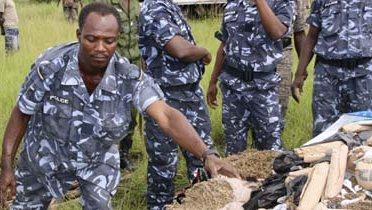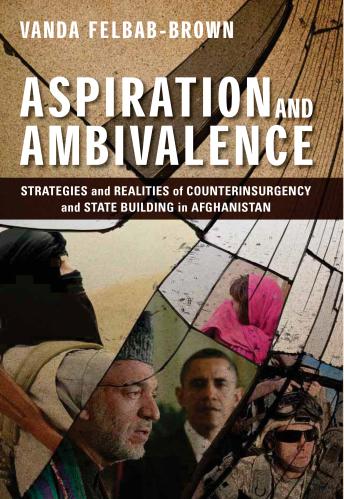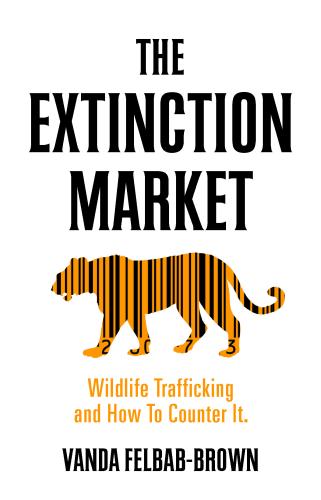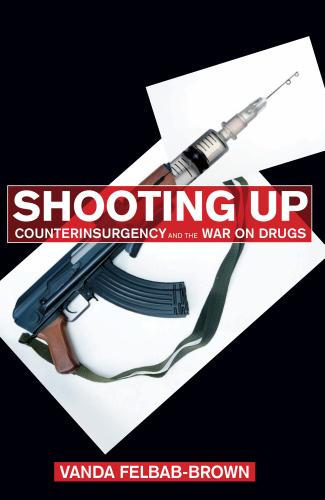Editor’s note: For the full article and most updated version, see Terrorism and Political Violence, 24:787-806, 2012. Read the introduction and recommendations below.
Introduction:
The interactions between organized crime and terrorist networks or other violent groups are often about resources. In some cases, transactional relationships are established, almost always on a temporary basis, when the criminals and terrorists see a mutual benefit to be derived from such collaboration. Some terrorist networks attempt to forge alliances of convenience with criminal groups for profit, access to illicit logistical chains, or for the sake of joining forces against a common enemy, the state.
In other cases, an adversarial relationship exists between organized crime and terrorist networks. Here, the presence of illicit economies may attract terrorists into a particular location, where they offer themselves as protectors of the population against the deficiencies of the state and the predatory behavior of criminal groups, and in return they expect to receive local support for their group. Of course, both organized crime and terror networks are just some of the many violent non-state and state actors who are pursuing access to, and control over, resources and population.
These kinds of interactions are particularly prominent in West Africa, where robust illicit economies—infused by globalization and other factors—have contributed to a substantial increase in trafficking activities. In turn, illicit economic activity compounds and intensifies a host of problems—such as corruption, predatory behavior of political elites, political instability, weakening of law enforcement and rule of law, and so forth—that enable the ideologies of terrorists to resonate among disaffected populations.[i]
Yet it is important to emphasize that despite some overall common characteristics of West African countries, their political arrangements and institutions, patterns of economic (under)development, and integration of illegal economies into the political terrain are hardly uniform. Nor is West Africa a monolithic region. Rather, it is characterized by a great diversity of political, economic, and social institutional arrangements and historic developments and legacies. There are great differences in political institutionalization, the quality of governance, economic performance and potential, and overall state-building trends in the region. Politically, economically, socially, and culturally, Ghana is not the same as Equatorial Guinea, for example. Nor does Senegal’s development over the past twenty years mimic that of Cote d’Ivoire or Liberia. West Africa’s various countries continue to experience divergent trends, with some previously affected by predatory rentier behavior and wars over economic rents showing important progress recently in managing their resources and combating illegal economies, while others have failed to do so. Liberia, for example, has achieved notable improvement — at least in terms of policy input — in its regulation of illegal logging. As with the analysis of any political and social processes, understanding the local texture and history is critical in studies of the nexus of political violence and illicit economies.
Even with this cautionary note, it is nonetheless possible to describe some broad patterns of violence and criminality in West Africa. The comparative analysis offered in this article draws on widely published frameworks of policy analysis and on field research in several West African countries to illustrate the dynamic relationships between political violence and organized crime in this vital sub-region.[ii] Particular attention is given to the increasingly vibrant drug trade in Guinea-Bissau and the various forms of political violence in Nigeria (which has the largest population, economy and security forces in West Africa). Then we examine recent policies and strategies pursued by the U.S. and the international community that, in the name of combating terrorism, seek to constrain the illicit economies of the sub-region, but in doing so may do more harm than good. For example, governing elites may profit from illicit trafficking activities, and thus be willing to provide safe haven for criminal groups to continue their operations. While on the surface they may be accepting U.S. and international counternarcotics and counterterrorism assistance, they may seek to undermine its effectiveness while at the same time improving their international image. Further, the weakest criminal groups can be eliminated through such an approach, with law enforcement inadvertently increasing the efficiency, lethality, and coercive and corruption power of the remaining criminal groups operating in the region.
Overall, this analysis illustrates why the international community and the United States need to engage with West Africa in law enforcement, counternarcotics, and counterterrorism operations with extreme caution. Senior policymakers must recognize that some governments in West Africa will come to see international counternarcotics aid as yet another form of rent to be acquired for their power and profit maximization, in the same way that they had often seen anti-Communism or counterterrorism aid. Such funds can be diverted for personal profits, or worse yet, used for violent actions against domestic political opposition, as a result undermining institutional development and effective and accountable governance in the sub-region. Further, building up law enforcement capacity and intervening against illicit economies in West Africa may often be perceived by local populations as antagonistic to their interests, and can exacerbate other governance challenges. The article concludes with several proposed guidelines for new policies that incorporate these considerations.
This comparative analysis leads to some overarching policy recommendations for combating the drug trade in West Africa, and reducing the potential for terrorist organizations to derive benefits from it.
First and foremost, it is unrealistic to expect that outside policy interventions in West Africa can eradicate all organized crime and illicit economies or for that matter of all the drug trade in the region. The priority for the United States and the international community should be to focus on the most disruptive and dangerous networks: those with the greatest links or potential links to international terrorist groups with global reach, those that are most rapacious and detrimental to society and the development of an equitable state in West Africa, and those that most concentrate rents from illicit economies to a narrow clique of people. These three criteria may occasionally be in conflict, and such conflicts will pose difficult policy dilemmas. In addition to considering the severity of the threat posed to the international community and to the host state and society by such drug trafficking or organized-crime groups, the estimated effectiveness of any policy intervention needs to be factored into the cost-benefit analysis of policy choices.
It is important to realize that indiscriminate and uniform application of law enforcement—whether external or internal—can generate several undesirable outcomes. For example, the weakest criminal groups can be eliminated through such an approach, with law enforcement inadvertently increasing the efficiency, lethality, and coercive and corruption power of the remaining criminal groups operating in the region. Further, such an application of law enforcement without prioritization can indeed push criminal groups into an alliance with terrorist groups—the opposite of what should be the purpose of law enforcement and especially outside policy intervention in West Africa. Both outcomes have repeatedly emerged in various regions of the world as a result of opportunistic, non-strategic drug interdiction policies.
Overall, the international community and the United States need to engage with West Africa’s countries in law enforcement, counternarcotics, and counterterrorism operations with extreme caution. A do-no-harm attitude and careful evaluation of the side effects of policy actions need to prominently figure in policy considerations.
Clearly, there are multiple risks in rushing to action in West Africa. First, there is the danger that with minimal presence of the United States and the international community on the ground, U.S. or internationally-trained law enforcement forces will “go rogue” and the international community will only end up training more capable drug traffickers or coup forces. Second, there is a not-insubstantial risk that some governments in West Africa will come to see international counternarcotics aid as yet another form of rent to be acquired for their power and profit maximization, in the same way that they have often seen anti-Communism or counterterrorism aid. Such funds can be diverted for personal profits; or worse yet used to take harmful actions against domestic political opposition, and undermine institutional development and effective and accountable governance in the region. And third, building up law enforcement capacity and intervening against illicit economies in West Africa may be perceived by local populations as antagonistic to their interests, particularly in countries like Nigeria, Senegal, Guinea-Bissau and others where most opportunities for a decent income are derived from engaging in shadow/black market economic activities.
The United States and the international community can reduce these dangers through several guiding principles. First, international assistance should be carefully calibrated to the absorptive capacity of the partner country. In places where state capacity is minimal and law enforcement often deeply corrupt, an initial focus on strengthening the police capacity to fight street crime, reducing corruption, and increasing the effectiveness and reach of the justice system may be the better initial intervention strategies than immediately establishing specialized anti-organized-crime or counternarcotics units. Only after careful monitoring by outside actors has determined that such assistance has been positively incorporated will it be fruitful to increase assistance for anti-organized crime efforts, including advanced-technology transfers and training. Careful monitoring of all counternarcotics programs—including their effects on the internal political arrangements and power distribution within the society and their intended effects on the power of criminal groups and their links to terrorist groups—needs to be consistently conducted by outside actors.
Further, the international policy package needs to include a focus on broad state-building and the fostering of good governance in West Africa. Policy interventions to reduce drug trafficking there, and to suppress any emergent crime-terror nexus, can only be effective if there is a genuine commitment and participation by recipient governments.
Finally, a broader institutional package, within which law enforcement and counternarcotics aid should be incorporated, should include:
a) the development of police forces that are responsive to their citizens’ concerns, such as street crime, and accountable to their citizens;
b) the strengthening of the capacity, transparency, and accountability of the recipient country’s justice system; and
c) a complementary focus on economic development that generates employment and social opportunities for the vast impoverished and marginalized segments of society in West Africa.
The goal of such programs should be to make sure that crime and illicit economies are not the only employment opportunity and hence perceived as legitimate. Such an approach, a long-term and difficult undertaking no doubt, will best reduce the political power of emerging domestic traffickers in West Africa and help mobilize the community’s cooperation with law enforcement.
[i] For a discussion on enabling environments for terrorism, please see James J.F. Forest, “Terrorism as a Product of Choices and Perceptions,” in Terrorizing Ourselves, edited by Benjamin H. Friedman, Jim Harper, and Christopher A. Preble (Washington, DC: Cato Institute, 2010), p. 23-44.
[ii] Specifically, this article draws on field research in West Africa conducted by James Forest, and on policy analysis and fieldwork in Latin America and Asia by Vanda Felbab-Brown, particularly regarding the effectiveness of various policy interventions to mitigate the crime-terror nexus.









Commentary
Political Violence and the Illicit Economies of West Africa
November 15, 2012